According to recent statistics, 77% of customers use search engines to discover local services such as accounting firms. So you need to maintain your online visibility to attract more clients. An effective SEO strategy can uplift your online presence with various techniques. These SEO for accountants are the best way to acquire clients for your accounting agency.
You have to increase your site visitors to reach a wider audience. Nowadays, most people do a Google search for specific services or products they need. Therefore, your online presence is very important to attract various clients. So, implementing SEO is the best choice for you. If your Google reviews are positive and your website is well-maintained with the right SEO strategy, then you may not be left behind in the search engine optimization (SEO) race.
So, in this guide, you’ll gain an in-depth knowledge about how you do keyword research and how to put it in your content to attract more organic traffic. Moreover, you’ll discover the whole technical SEO part, like how you will increase your site speed and optimise it for mobile devices and other technical considerations you need to maintain your website properly. Furthermore, on-page SEO for accountants and off-page SEO are also in the list.
So, let’s discover how you will do the search engine optimization (SEO) for your website and rank it on the first page. Let’s start with the definition of seo for accountants and then go on.
What Is SEO For Accountants?
SEO stands for search engine optimization. SEO for accountants is the process of ranking your website on search engines. When people search engines like Google for “accountant near me,” a successful SEO strategy helps your business show up first in Google search results.
You can think of it like you are putting up a big, bright sign that says “Great Accountant Here!” so that your target audience can find you easily. SEO helps your website appear in organic search results (the free listings, not ads). So that you reach a wider audience online.
Why Should Accountants Need Search Engine Optimization (SEO)?
- The Digital Evolution of Customer Acquisition – The Accounting sector has made a major transition to digital client acquisition. Contemporary customers now conduct their initial search online rather than through the yellow pages or recommendations. Search engine optimisation (SEO) is very important for accountants to remain visible to potential clients.
- Clients Find Accounting Services Online– The majority of clients look up several accountants online before contacting a particular one. These prospective customers are actively looking for your services, but your company is invisible to them if you don’t have proper organic SEO.
- ROI Potential: Organic Search vs. Paid Advertising– You are comparing SEO to paid advertising, then organic SEO services give you the long-term result. When you stop paying for paid advertisements, they stop producing leads; however, effective SEO services keep bringing in customers every day. Professional SEO services yield a 300–500% return on investment for many businesses in the first year.
How to Do Keyword Research for Accounting Firms?
Keywords are the specific search terms used by your audience to search for specific services or products.SEO keywords for accountants are the most important part of search engine optimisation. If you want to rank higher in the search engine results pages, then you need to choose the correct keywords for your website and content as well. You have to have a keen knowledge of your potential client’s search intent.
Types of Keywords:
- Short Keywords (1-2 words): “taxes” – Hard to rank, lots of competition
- Long Keywords (3+ words): “small business tax help” – Easier to rank, more specific
- Local Keywords: “tax accountant Chicago” – Great for local businesses
- Question Keywords: “how much does CPA cost” – People wanting answers
- Buying Keywords: “hire tax professional” – Here, most people are ready to pay
- Golden Rule: Pick keywords your customers search for, not what sounds fancy!
What Are The Best Keyword Research Tools?
- Free Tools:
- Google Keyword Planner
- Google Trends
- Premium Tools:
- Semrush
- Ahrefs
- Moz Keyword Explorer
- KWFinder by Mangools
Before using a particular keyword research tool, you can take resources from Google Autocomplete to find “seed” keywords. Like, you can put your main keywords and get the related terms your target audience searched for.
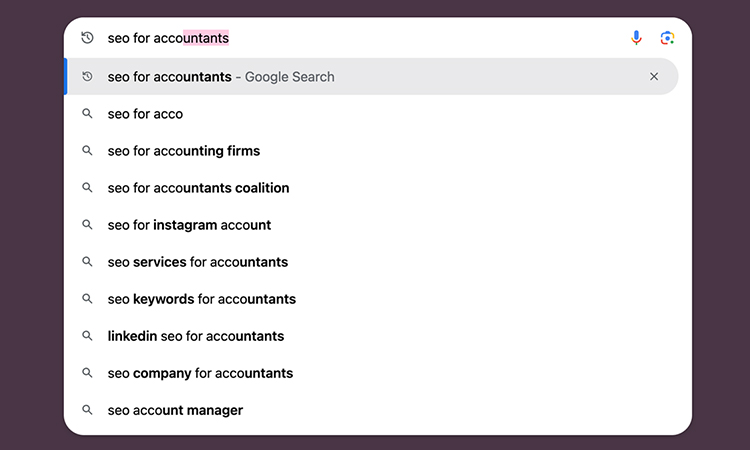
You can utilize Ahrefs to research relevant keywords. Let’s have a look at how you will do this.
Step 1- Log in to Ahrefs
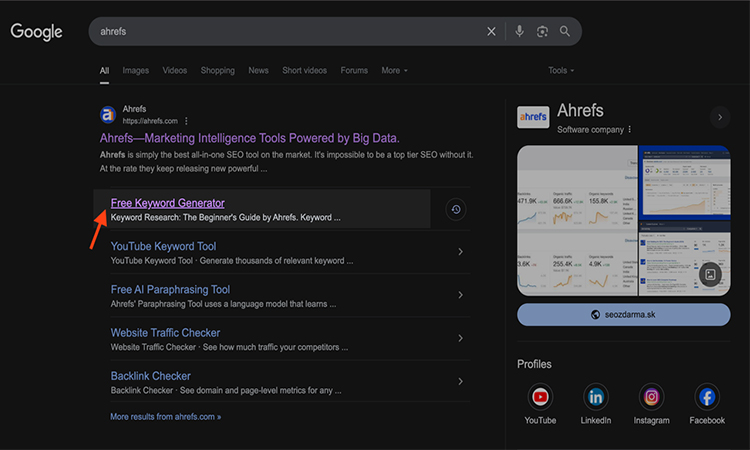
Step 2- Put your seed keywords
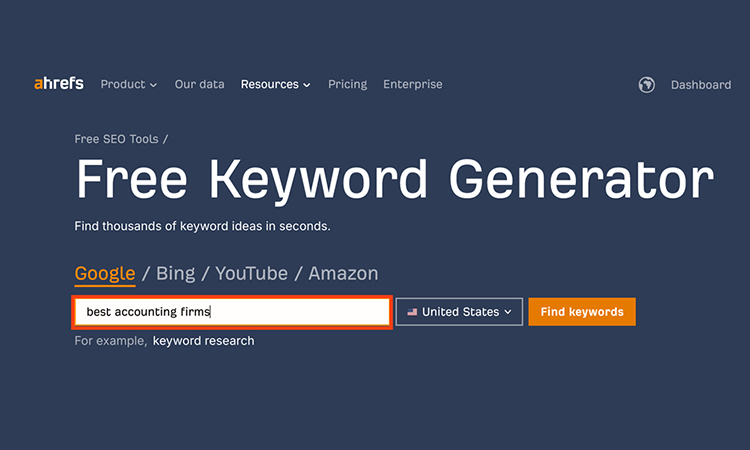
Step 3- Measure keyword search volume and difficulty
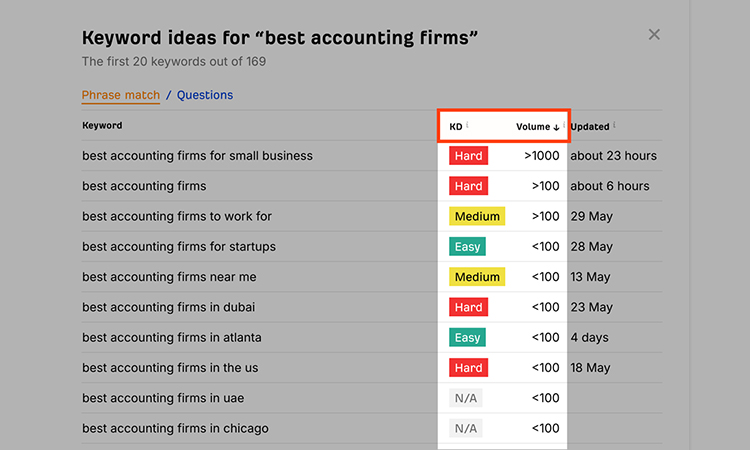
What is Keyword Volume?
Search volume measures the total number of searches performed through search engines, expressed as the average monthly volume during the previous 12-month period.
- High Volume (10,000+ searches/month) = EVERYONE is searching for it
- Medium Volume (1,000-10,000 searches/month) = lots of people know about it
- Low Volume (100-1,000 searches/month) = some people search for it
- Very Low Volume (<100 searches/month) = almost nobody searches for it
Simple Rule: Higher volume = more people want to find this thing online
What is Keyword Difficulty (KD)?
Keyword difficulty shows how hard it is to rank for a specific keyword – the lower the score, the easier it should be to rank.
- 0-20: Very Easy (new sites can rank)
- 21-40: Easy (some authority needed)
- 41-60: Medium (established sites required)
- 61-80: Hard (strong authority needed)
- 81-100: Very Hard (extremely difficult to rank)
Simple Rule: Higher KD = harder to get your website to show up first on Google
How to Choose the Right Combination?
- Volume: 1,000-5,000 (decent popularity)
- KD: 20-40 (not too hard, not too easy)
Step 4- You can select the “question” format.
Consider Volume Context:
- High-volume keywords can attract more traffic, but often have tougher competition
- Long-tail keywords often have lower volume but higher conversion rates
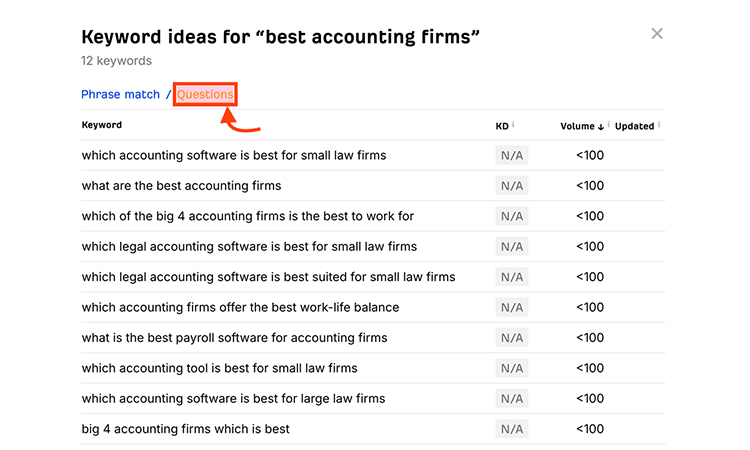
Keyword Prioritization Matrix:
- High Volume + Low Difficulty = Priority 1
- Medium Volume + Low Difficulty = Priority 2
- High Volume + High Difficulty = Long-term targets
- Low Volume + High Difficulty = Avoid
Where to use keywords?
- First, you have to put keywords at the beginning. For Example: “Tax Preparation Services | Chicago CPA Firm”
- Second, you have to use your main keywords in the first 100 words of the paragraph.
- Don’t forget to use meta descriptions and title tags.
- Use keywords when describing images accurately
- Include the main keyword in the URL. Example: yoursite.com/tax-preparation-chicago
What Is The Best Content Marketing Strategy For Accountants?
Content marketing is the most important aspect of SEO for accountants. More people will discover your accounting business online when you create quality content. Compelling and informative content can establish your accounting firm as a trusted authority in the field. Let’s learn what content works best and how to make it!
Most people have faith in CPA firms when they produce informative articles. So, this helps your accounting business expand faster than your rivals.
Why E-E-A-T is Important for Accounting Website Content?
E-E-A-T (Experience, Expertise, Authoritativeness, Trustworthiness) is crucial for accounting websites because financial advice directly impacts people’s lives and money. Google considers accounting a “Your Money or Your Life” (YMYL) topic, requiring higher content standards.
Experience: It shows the real-world accounting experience through case studies and client examples.
Expertise: It will help you to showcase CPA certifications, degrees, and specialised knowledge in tax law.
Authoritativeness: You can build authority through professional affiliations, media mentions, and industry recognition.
Trustworthiness: Then you should display licenses, testimonials, secure website features, and transparent business information.
Strong E-E-A-T signals help accounting websites rank higher and build client confidence in sensitive financial matters.
What Kind Of Content Is Best For Accountants?
- Blog Posts (Best for Everyone)
Blog posts are another way to reach your target audiences. You can update your blogs with relevant information from accurate sources. Your blog post will develop legitimacy in the accounting field.
- You can write about tax tips during tax season.
- Then you can explain money topics in simple words.
- Moreover, try to answer questions your clients ask.
- You can integrate a call-to-action button to attract more traffic to your website.
- Quality blog content can attract organic traffic to your website and improve search rankings.
- How-To Guides (For Small Business Owners)
Then you can write informative blogs to give guidance about various aspects of accounting. These blogs should match search intent when people want to learn. Such as
- “How to Track Business Expenses”
- “5 Steps to Prepare for Tax Season”
- Which legal accounting software is best suited for small law firms?
- Tax Deadline Reminders (For All Clients)
You can send monthly email reminders. Then you can share important dates regarding tax filing and other financial news updates.
- Videos (For Younger Clients)
Visuals can attract more traffic to your website. So you can create short videos explaining tax basics.
- Give clear, understandable examples.
- More people share videos than words.
- Guest Blog Posts (For Building Authority)
Guest posting can be beneficial for your brand promotion. You will write articles for various business websites. And they will mention your name on their website. When various authentic websites mention your brand name, it signals Google that you’re relevant and should be the search engine result pages.
How To Get Organic Traffic Through Content?
Question-Based Articles: When you add question-based articles, it seems that you will cover all queries your audience has.Such as-
- “Which accounting software is best for small law firms?”
- “What is the best payroll software for accounting firms ?”
- These match exactly what people type into Google.
You can go to Google People Also Ask and get your relevant questions and give answers in your blogs.
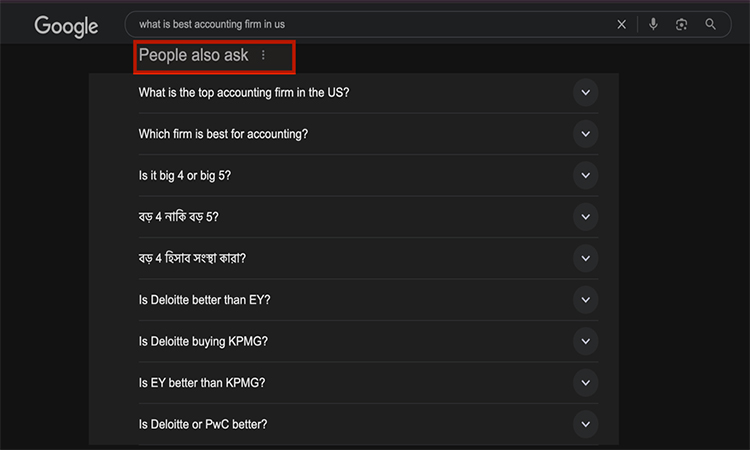
Then you can take help from “Answer to the Public” tools; there you get hundreds of questions with relevant information you need to improve your blog rankings.
Local Content:
In the accounting industry, you need to focus on local clients, too. The local blogs can attract local customers. So you can write region-specific blogs, like
- “Best accounting firms in Atlanta”
- “best accounting firms in Chicago “
Seasonal Content:
- Tax advice before due dates
- Advice for year-end planning
- Guidelines for recording business expenses
Top 4 Useful Strategies To Rank Your Content Higher
- Maintain Consistency
- You should publish new blogs. Every week.
- Avoid publishing ten articles and then becoming silent for many months.
- Make Your Content Visible
- Post on social media.
- Distribute to subscribers of your email.
- Invite your satisfied customers to share your posts.
- Consult an SEO Expert
- If you need the best results, then you may consult with a professional SEO agency to boost SEO for accountants.
- An expert in SEO is aware of how to use SEO strategies and get the best result for you.
- They can help you develop a successful SEO plan.
- Monitor What Is Effective
- Check out the articles that get the most views.
- Examine the material that attracts new customers.
- You have to always look for more techniques to use for improving your SEO results.
Quick Success Tips
- Write like you’re talking to a friend.
- Use real examples from your work.
- Answer questions before people ask them.
- Updating existing blog posts can improve their visibility and maintain their relevance over time.
Keep in mind that effective content takes time to produce. You should continue generating informative content, and gradually, more individuals will come to your accounting company on the internet. You can help individuals with their financial issues by offering simple, practical counsel, which is very important for them.
How Does Local SEO Help Accountants Get More Nearby Clients?
Local SEO for accountants is the best way to catch your local clients. You need to focus on your area so that you can spread your brand name properly. A Google My Business profile can list your accounting firm and appear on Google search and Google Maps. Moreover, you can ask loyal clients for Google reviews that can help generate new clients.
Google Business Profile is a free tool that helps businesses marketing and manage how they show up in Google Search and Maps. Gaining Google reviews is one of the biggest ranking factors for local SEO. It is essential to your local SEO strategy because it increases your presence in Google search results and your prominence in local searches.
Why is Google Business Profile important?
- Your web pages can get more clicks, calls, and visits if your profile is well optimised.
- Google My Business allows businesses to be discovered without needing a website.
- You can monitor performance and improve your ranking in local search results by integrating it with tools like Google Analytics and Google Search Console. It also supports your overall SEO efforts.
Quick 7-Step Guide to Create a Google Business Profile
Step 1- Visit the Site & Sign In
- Go to google.com/business
- Sign in with your Google account
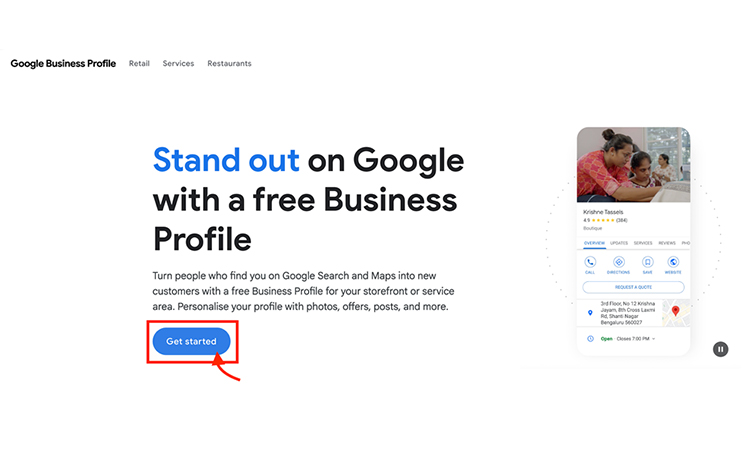
Step 2 – Enter Your Business Details
- Add your business name, category, and location
- Include service areas if applicable
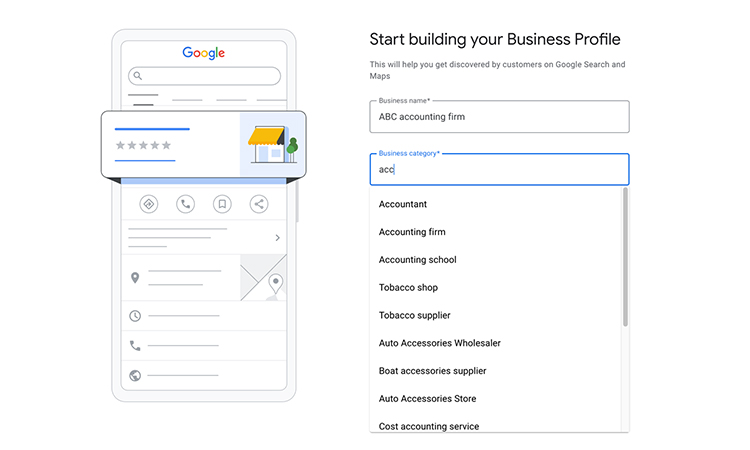
Step 3- Enter your Business Address
- You have to add your company location with all the details
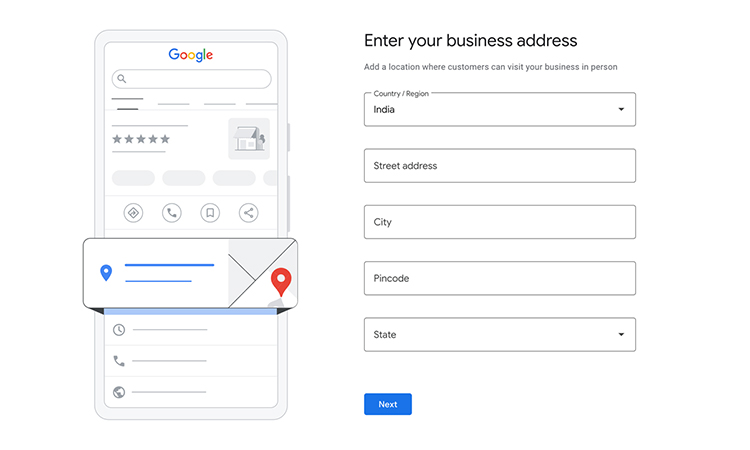
Choose your address on Google Maps.
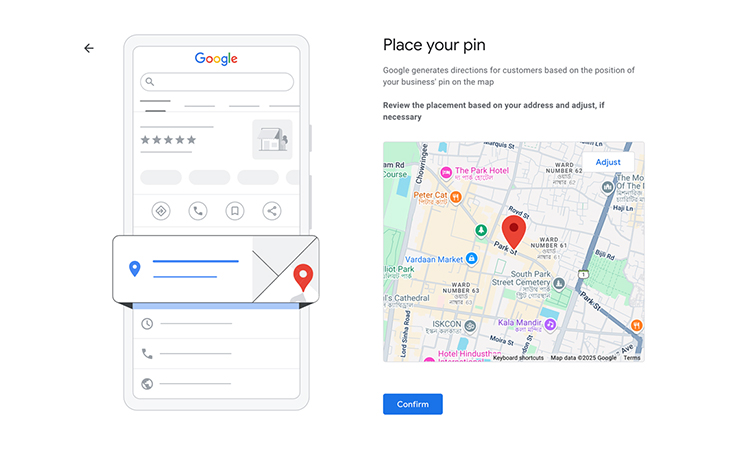
Step 4 – Add your phone number
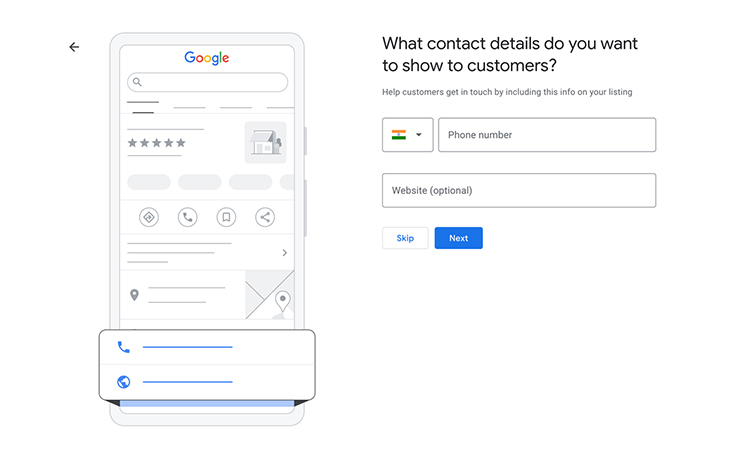
Step 5- Verify Your Business
- Now you select your preferred method: Postcard, Phone, Email, or Video
- Then you can complete verification to activate the listing
Step 6- Set Up Your Profile
- You can add business hours, description, logo, and photos
Step 7- Keep It Updated
- Post updates, reply to reviews, and manage messages regularly
Local Citations and Directory Listings
A natural way to build citations is to find online references of your business name, address, and phone number (NAP). Make sure you’re listed in reliable business directories that are associated with accounting services. These references help online search engines figure out where your business is located and how reputable it is.
NAP Consistency: You have to ensure that your company’s data is consistent across all platforms. Including your business location on your Google My Business profile helps customers find your address easily. Search engines get confused when information isn’t constant, which can hurt your local rankings. Therefore, you need to check your listings regularly to maintain consistency.
Industry-Specific Directories: You should focus on accounting-specific directories such as
- CPA directory listings
- Professional accounting associations
- Local business chambers
- Financial services directories
Voice Search Optimisation for Accounting Services
Voice optimisation requires ongoing SEO research to understand how your target audience phrases search queries. When people talk to voice assistants about their accounting needs, you should focus on local, everyday phrases that people can use.
- Optimising for Voice-Activated Assistants- Voice search via Alexa, Google Assistant, and Siri is revolutionising the way people look for accounting services. Voice searches are longer and more conversational than traditional search queries. You need to modify your digital marketing strategy to include these search terms in voice-activated devices and other search engines.
- Conversational Keyword Targeting- In the past, SEO studies were mostly about short phrases like “CPA services.” “Where can I find a good accountant near me for small business taxes?” This is the most searched term in voice queries for the last decade. If you want to increase your website visitors and speak their questions out loud, you need to focus on these conversational search terms.
- Featured Snippet Optimisation- Voice assistants frequently read featured snippets as responses. You have to organise your content in a way that it directly addresses frequently asked accounting questions. Your Keyword-rich headings and short paragraphs help search engines pull out voice responses.
- FAQ Schema Implementation- The FAQ schema markup helps search engines understand your question-and-answer content on your website. This structured data makes it easy so that your business will show up in voice search results when someone asks an accounting question.
Where Should You Build Backlinks for Accounting Websites?
Backlinks from reputable websites can enhance your site’s authority and improve its rankings in search results. Search engine optimization depends on getting high-quality backlinks. As part of a complete SEO strategy, accounting firms need to build strategic link building to improve the exposure of their web pages and make their local SEO presence more powerful.
- Industry-Specific Sources- First, you can aim for business and finance magazines, accounting trade publications, and the websites of professional organisations. These reliable sources improve your accountant SEO reputation and signal expertise to search engines. Backlinks are very helpful, and you can get them by guest posting on accounting blogs and participating in niche forums.
- Local Business Connections- Then you can work together with community groups, business associations, and chambers of commerce in your area. You can improve your local SEO with these backlinks, which will help you rank higher for searches that are based on location. You can get mentions and links from their websites by sponsoring local events or charities.
- Professional Networks- Moreover, you can talk to companies that work with yours, like law firms, real estate agents, and financial planners. Through cross-referral partnerships, two websites can naturally link to each other, which improves SEO efforts.
- Content Marketing Approach- If you want to get other web pages to naturally link to yours, make useful things like tax guides, financial checklists, and business frameworks. This approach supports your overall SEO journey by acquiring organic backlinks.
Frequent SEO audit procedures aid in locating backlink prospects. Professional SEO services can quicken your link-building efforts by targeting high-authority domains relevant to accounting services, ensuring sustainable long-term results for your practice.
What Are The On-Page SEO Techniques For Accountants?
On-Page SEO refers to optimising the elements within your website to help it rank higher in search engine results pages. For accounting firms, it’s about making sure your content, structure, and keywords are aligned with what your target audience is searching for. On-page SEO enhances your firm’s online presence, attracts the right audience, and supports your SEO services for accountants. It’s a fundamental step before spending money on advertisements or more complex strategies.
These techniques ensure that search engines and potential clients can easily understand what your site is about.
- Use Target Keywords Strategically
Your on-page search engine optimisation starts with relevant keyword research. You need to find the keywords and then put them accordingly. As I have already mentioned, the keyword research process is a good starting point from which you can create a relevant keyword list.
You can use search terms like accounting services, tax filing help, financial advisor near me, etc.
- Place them in:
- Page titles (e.g., “Expert Tax Services | ABC Accounting Firm”)
- Headings (H1, H2)
- Meta descriptions and meta titles
- First paragraph of content
- Image alt text
- Improve Meta Tags
- Title tag: This is the first thing your target audience will see. So it should be short, related to your website content, and unique. Your meta titles should be very eye-catching and engaged with search intent.
- You need to incorporate your primary keyword and keep it to 60 characters or less.
- Example: Top SEO Services for Accounting Firms
- Meta description: This is the summarised version of your web page content. The word count should be within 150–160 characters.
- If you want to improve your meta description, you can add keywords like “best accountants near me” or “best accounting firm in san diego”.
- Create SEO-Friendly URLs
The uniform resource locator, or URL, is the address of your webpage. You should optimise it very carefully. As most of your target audience gets this as their gateway to your website.
- Your URLs will be better for SEO if they are short, easy to read, and full of keywords.
- Do not use numbers or symbols. Put hyphens between words and include things that are important, like your service and place.
- For example, use /tax-consultant-mumbai instead of /page?id=123.
- Use Internal Linking
The internal link will help your web pages connect. This can improve the user experience by providing easy navigation between related content. Moreover, internal linking can also help search engines better understand the structure and hierarchy of your website.
- E.g., from “Income Tax Return Services” to “Audit & Compliance Support.”
- Use Header Tags (H1-H3) Properly
- Each page has one H1 tag, which is the main text.
- Use H2 and H3 for layout and subtopics.
Why Is Off-Page SEO Important for Accountants?
Off-page search engine optimization includes everything you do outside of your website that helps it rank higher in search engines. On-page SEO is all about making your web pages better. Off-page SEO, on the other hand, is all about making your site more popular, legitimate, and valuable across the internet. For accounting firms, this is necessary to attract more organic traffic and compete in a crowded market.
Key Components For Off-Page Search Engine Optimization (SEO)-
Off-page SEO is a vital part of a full SEO services strategy, helping search engines view your website as trustworthy and authoritative, which improves prominence and draws in more organic traffic.
Social Media Engagement for Accountants SEO
You can use platform-specific strategies-
LinkedIn (Primary Platform for Accountants)
- You can post tax tips, business financial help, and news twice or thrice a week.
- If your clients permit you, share case studies and success stories.
- Join business and accounting groups and take part in the group talks.
- You can develop LinkedIn posts with complicated tax issues easier for business owners to understand.
- If you’re in the area, talk to business owners, other CPAs, and possible marketing partners.
- #SmallBusinessTax, #AccountingTips, and #TaxPlanning are some terms you can use.
Facebook for Local Presence
- You have to make a business page for your company with full personal details.
- Post office news, staff greetings, and material from behind the scenes
- Send out holiday tax notes and due date alerts.
- As tax season goes on, hold live Q&As.
- In your area, you can join pages for businesses and neighbourhoods.
- Moreover, you can develop Facebook events for tax classes or training.
Twitter/X for Real-Time Updates
- You need to tweet every day with tax and money tips.
- Then you can promptly answer questions and comments about taxes.
- You can tell others about important tax law changes.
- Talk to business accounts and other pros.
- This is tax season, so use popular terms.
Systematic Review Collection Process
Timing Strategy:
- As soon as you’re done filing your taxes, ask for reviews.
- Follow up one to two weeks after the service is over.
- Send notes during calls to make sure clients are happy.
- You should produce seasonally appropriate advertisements during tax season.
Multi-Channel Approach:
- You can send an email to connect with your clients more personally. And then ask for reviews.
- Follow-up texts requesting that you check something out
- Business cards with QR codes that lead to review sites
- You can ask for reviews that should be on bills and receipts.
How to respond to negative reviews professionally?
- You should first professionally accept the issue.
- Then, sorry for any trouble this may have caused.
- Moreover, you have to talk to your clients in secret to solve it.
- Don’t fight or get defensive in public.
- You need to do a follow-up in person to find closure.
Media Outreach Strategy
- You should get to know the business writers in your area.
- Then, you may give your opinion on changes to tax laws.
- You can use quotes for small business financial stories.
- Write viewpoints about economic problems in your area.
- Take part in radio shows while tax season is going on.
Journalist Outreach:
- Make a list of media contacts with the writers of your area.
- Send regular updates about when you’re available to get quotations.
- Respond quickly (within two hours) to calls from the public.
- Give correct facts that can be quoted.
- Follow up with more information.
What are Technical SEO Components for Accounting Websites?
Accounting firms need to have strong technical SEO strategies. These improvements help search engines crawl, understand, and rank your website properly. If you’re implementing SEO audits, it can also give you exposure in local search results.
Website Speed Optimization and Core Web Vitals
Google’s Core Web Vitals measures user experience using three main metrics: Largest Contentful Paint (LCP), First Input Delay (FID), and Cumulative Layout Shift (CLS). Accounting websites that deal with private financial data need to run quickly so that they attract more organic traffic.
How to Optimise Website Speed?
Image Optimisation:
- You can use free tools like TinyPNG or WebP format to compress all of your images.
- Then you may resize all of your images to fit their new measurements.
- Use lazy loading for images below the fold.
- Implement responsive images with selected attributes.
Improve your code:
- First, you need to increase the size of HTML, JavaScript, and CSS files. So that your website can feel free.
- Then, you should get rid of code and apps that aren’t being used.
- Moreover, you can combine several CSS and JS files into a single request.
- Set your host to use GZIP compression.
Caching Implementation:
- Add the right date marks to your browser’s cache.
- Then you should utilise server-side caching, like Memcached or Redis.
- Content Delivery Networks (CDNs) like Cloudflare should be used.
- Page caching for static information needs to be turned on.
Server Efficiency:
- Pick a good server service that offers SSD storage.
- Improve database searches and remove irrelevant information.
- Then you should check your computer’s reaction times frequently.
- You might You should consider updating your server plan while tax season is going on,
Indexing For Mobile Devices First, And Responsive Design
Google now primarily uses mobile versions of websites for indexing and ranking. Your accounting website must be fully mobile-friendly to maintain search visibility.
Touch-Friendly Elements:
- To make it easy to tap, make buttons at least 44px big.
- Make sure that there is enough space between clickable items.
- Use font sizes that are easy to read (at least 16px on mobile).
- Add swipe motions to picture galleries.
Mobile Navigation:
- Make hamburger choices that can be folded down.
- Your contact information is very important, so design it clearly.
- Moreover, to make more authentic use of your business phone numbers.
- Your forms should be open on mobile easily.
Testing Mobile Performance:
- Go to Google’s Mobile-Friendly Test and use it.
- Don’t just test in a browser on your desktop; rather, check it on various mobiles.
- Check how fast 3G links can load pages.
- Keep an eye on analytics’ mobile bounce rates.
SSL Certificates and Website Security
When it comes to SEO and client trust, security is very important for accounting websites because they deal with very private financial information.
How to install SSL Certificates:
- You should buy Secure Sockets Layer, or SSL, keys from reputable companies.
- You can use the hosting control panel or call hosting support to install certificates.
- Set up the certificate to update itself automatically.
- Use the SSL Labs tool to test how SSL is being used.
HTTPS Redirect Setup:
HTTPS (HyperText Transfer Protocol Secure) is a secure version of HTTP that encrypts data between your website and visitors’ browsers. It’s very important for accounting websites because it keeps hackers from getting to private financial data and improves trust with clients and search engines.
Additional Security Measures:
- Set headers for HTTP Strict Transport Security (HSTS)
- Add messages for the Content Security Policy (CSP).
- Plugin security changes and scans on a regular basis.
- Access for administrators with two-factor login
- Regular files are stored safely
Structure Of Urls And Site Layout
SEO-Friendly URL Structure should be clear, descriptive so that both the user experience and the search engine understand.
Best Practices for Accounting Websites:
Good: yourfirm.com/services/small-business-tax-preparation
Bad: yourfirm.com/page?id=123&service=tax
Logical Hierarchy:
- Homepage → Services → Specific Service Pages
- About → Team → Individual Accountant Pages
- Resources → Blog → Individual Articles
- Contact → Location Pages (for multiple offices)
Internal Linking Strategy:
- Link related services together (tax prep → bookkeeping).
- Group topics together that have to do with accounting.
- For internal links, use anchor text that describes the link.
- Use navigation with breadcrumbs- Breadcrumbs are navigation links showing users their current page location within your website’s hierarchy (Home > Services > Tax Preparation). They improve user experience by helping website visitors understand where they are and easily jump back to previous sections, while also helping search engines understand your site structure.
Schema Markup for Professional Services
Search engines can better understand your accounting services and show more relevant information about them when you use Professional Service Schema markup.
Local Business Schema:
- Name, address, and phone number (NAP) should be included.
- Put in work hours and places that you serve.
- Set up a review system for feedback.
- Add business titles and qualifications.
XML Sitemaps and Robots.txt Optimisation
An XML sitemap helps search engines to identify and list all of your accounting website’s important pages.
Structure of a Sitemap for Accounting Firms:
- Add all of the business pages and places.
- Put up blog posts and pages with resources.
- Add new information to sitemaps instantly.
- Send Google Search Console sitemaps.
Robots.txt Optimisation:
Steps for Implementation:
- For each type of information, make a separate website.
- For visual information, add picture sitemaps.
- Keep an eye on Search Console for crawl errors.
- You can change any limited places in robots.txt.
How to Measure SEO Performance for Your Accounting Firm?
SEO performance tracking is very important for accounting firms to understand their search engine optimization success. A prominent SEO analytics for accountants helps evaluate client acquisition and ROI from digital marketing campaigns.
- Important SEO Metrics for Accounting Firms- First, you can keep an eye on your keyword research results, organic traffic, exposure in local search, and conversion rates. Then you should check how many client emails, calls, through organic search.
- You can take help from Google Analytics 4- You can keep track of website visits, popular service pages, and user activity by installing Google Analytics. To track how many leads you’re getting, set goals for things like phone calls, contact forms, and meeting plans.
- Optimise the Google Search Console – You can track search impressions, clicks, and rankings for searches connected to accounting. Then monitor the effectiveness of local searches and spot any technological issues. You should fix all the broken links and frequently check your site speed and mobile responsiveness.
- Local Ranking Tracking- Moreover, you can use tools to track the results of location-specific and “accountant near me” searches. Check the analytics and SEO performance of your Google Business Profile.
- ROI Calculation- Then you should compare the expenses of acquiring new clients against their lifetime worth. Furthermore, professional SEO services make it easier to set up thorough monitoring systems that accurately determine how organic search efforts shape a business.
What’s the Future of SEO in the Accounting Industry?
- 2025 SEO trends including AI and voice search- As accounting businesses adjust to conversational questions like “How can I find a tax advisor near me?” AI-powered natural language processing (NLP) algorithms will be necessary in designing content for voice search. AI-powered solutions may save up to 50% of the time spent on data analysis and interpretation, and 19% of marketers expect to use AI in search in their SEO strategy by 2025.
- Preparing for algorithm updates- Google’s 2025 upgrades call for two priorities: long-term innovation and urgent technical compliance (Core Web Vitals, E-E-A-T). Because UX will be given more weight in Google’s SEO algorithm. Moreover, accounting websites must have mobile-friendly designs and faster loading times.
- Building sustainable, long-term SEO practices- Most of the brands will prioritize conversions over traffic and quality over quantity. Moreover, the strategic AI integration will emerge victorious in the search environment of 2025 and beyond. You have to focus on crafting original content with actual knowledge rather than employing volume-based tactics.
- Integration with other digital marketing channels- For a complete online presence, successful accounting companies will combine SEO with social media, email marketing, and local advertising. They will prioritize real customer connections above algorithmic improvement alone.
Final Takeaways
So, at the end of our guide, I can assume that you have all the necessary queries covered for SEO for accountants. You know how to research keywords, but one thing to keep in mind is that you should not do keyword stuffing. These can affect your ranking in search engine results pages.
Search engine optimization is a lengthy process, so you have to be patient. But you will definitely see the results. Your accounting firm will dominate the whole industry with the right SEO strategies. So you can consult an SEO professional to get the best for your brand.


